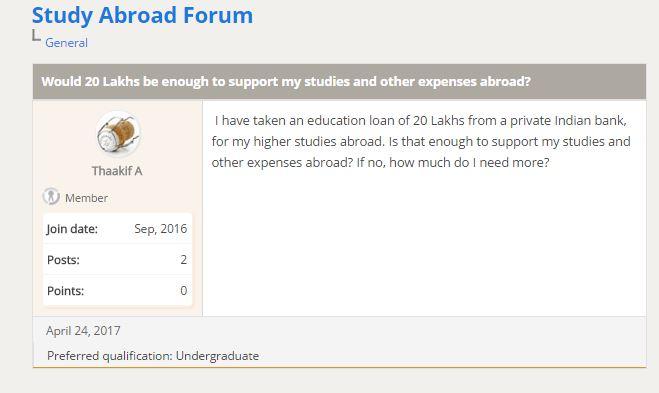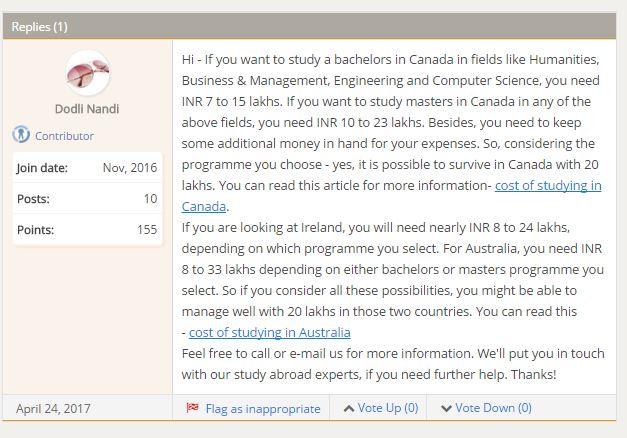What’s included in this article?
- How to study abroad for free or with less money?
- Research
- Scholarships
- Saving money on living expenses
- Look for distance education programmes
- Pick places with a low cost of living
- Studying abroad for free
- 5 cheapest countries to study abroad for Indian students
- Study abroad for free in Germany
- Study abroad for free or low cost in Norway
- Study abroad with less money in France
- Study abroad for free in Finland
- Study abroad with less money in Greece
- FAQs
Some students might wonder how to study abroad with less money. It becomes difficult when they can’t find a sponsor to support them financially. They neither want to burden their parents nor do they want to give up their dreams owing to their financial constraints. This article tells you how to study abroad for free or for less money and which countries offer free education.
How can you study abroad for free or with less money?
What possible steps can you take to make your dreams of studying abroad a reality? Here are our top 5 tips.
1. Research!
- Many top institutions in the USA offer ‘need-blind admissions’ - if you are a really meticulous student who has good academic records, your financial constraints won’t stop you from getting admissions. You’ll be granted admissions purely based on merit, not based on how much money you can afford to spend on your education.
- If you don’t have enough money, apply for some good international scholarships* – the biggest advantage is that you don’t have to pay it back.
- Look for cost-effective or economic countries such as Germany and Canada. (The best source of information to know about a few more cost-effective countries is our counsellors).
Another crucial factor, besides money, which determines if you can study abroad with less money is, ‘time’. Time will decide where and what course you get to choose. You have a higher chance of getting scholarships if you apply early to certain colleges and universities abroad. These are scholarships offered on a first-come-first-serve basis. If you apply early with all the required documents, then the chances of receiving the acceptance letter are high, but if you delay, then you might lose a few opportunities.
Similarly, if you clear any of the standardised tests early on and earn a good score, you can get admission at a university or college abroad at a right time. Simply put – you need to see where you stand so ask these questions to yourself:
- How good is your SOP/ LOR?
- Do you have good IELTS/TOEFL/PTE/SAT scores?
- How well have you written your application letter?
- Have you done some out-of-classroom activities in your chosen field?
- Is your academic record above average?
2. Look for scholarships
Look for banks that offer scholarships to international students at lower interest rates compared to others. Be conscious of the financial decisions you make. You do not want to incur debts and keep re-paying them for a long time.
*There are hundreds of scholarship websites that could be useful. Here are a few:
- India Study Abroad Centre
- Alliance for Global Education Need-Based Scholarships
- German Academic Exchange Service
- Eastern European Study Abroad
- Uniplaces Scholarships – a website that helps students support their accommodation expenses.
- Otago Polytechnic Scholarships
- Unitec Institute of Technology Scholarships
Now, these are the things that you need to figure out beforehand. All this put together will help you fetch a good university and college that will understand your economic problems and will not hesitate to grant you admission.
3. Save money on living expenses
To save money while studying abroad, you will have to plan before leaving your country. What could be the possible ways to manage with less money abroad?
- Find a part-time job.
- Work as an assistant researcher or teacher in your college or university.
- Look for cheaper accommodation options, such as homestays and shared apartments. Sharing your living space with someone can help both of you split the cost of groceries and other utilities. Also, cook for yourself and save money on eating out frequently.
- Cut down all additional expenses like transportation costs. Check with your university abroad if they can provide students passes for your daily commute.
- Try spending more time in your college or university libraries so that you can save the cost of purchasing books that are not must-buys.
- Familiarise yourself with the budget of the country to which you are heading. Refrain from buying souvenirs, if you are really looking at ‘saving’.
- You can also save the cost of international calls by purchasing a calling card.
- Special offers: Many countries provide International Student ID cards that will help you save money on just about anything. You can get discounts, and you can use them at places like salons, clothing stores, restaurants, etc.
Related: 7 easy ways to earn money while studying abroad.
4. Look for distance education programmes
If your priority is an international education and not really the experience of studying in a foreign country, you can look for distance education programmes abroad. Some universities also online course with just a couple of weeks of on-campus sessions. This will give you the best of both worlds. Enquire about such courses and see if it matches your requirements.
5. Pick places with a low cost of living
As far as the total expenses are concerned, the destination and the location within the country also matter. For example, a country like Greece has a low cost of living. If you want to study in the UK, you should know that London is far more expensive than other cities in the UK. You have to make a wise choice by studying at a location that is cheaper, but also has top-class universities.
Start planning now! If you have everything that takes to earn an international degree, then having less money should not pull you down. Start with small steps and you will definitely reach your goal. Our study abroad experts will guide you in selecting countries based on your budget.
A while ago, we received a question on our students’ forum – 'Would 20 lakhs be enough to support my studies and other expenses abroad?'

The answer to it was –

We are sure several students will have similar questions and they might be looking for options that require limited money.
So will you be able to study abroad even if you don’t have large amounts of money? The precise answer is – yes, you’ll definitely get to do that!
Now let’s introduce you to options at different destinations to study for free or with less money.
Studying abroad for free
We naturally assume that studying abroad will cost us several lakhs and we end up hesitating to even harbour that dream. But there is hope. Not everyone studying abroad spends multiple lakhs to get an international degree. One of my friends went abroad to study without spending a penny. He was automatically selected for a scholarship offered by the university, which was also willing to pay the flight ticket expenses. The only expenses that he has to take care of are his living expenses. He is managing quite well with his part-time job.
5 cheapest countries to study abroad for Indian students
- Germany
- Norway
- France
- Finland
- Greece
Study abroad for free in Germany
- Most public universities in Germany do not charge tuition fees to their students. The state finances these higher education institutions.
- The fee exemption applies to international students too.
Are there any other charges involved?
- Some continuing education master’s programmes might require that candidates pay some tuition fee. But this is not high compared to the fee to be paid at other destinations.
- Baden-Württemberg, one of the Federal States charge non-EU students a tuition fee of €1500 (Approximately 1,30,000 INR) for master’s, bachelor’s and diploma courses.
- Though there is no tuition fee, all students are required to pay a semester fee. It is between €100 and €350 (Approx. 8600 – 30,000 INR). It contributes towards student services and the student government.
- Living expenses in Germany come up to €870 (Approx. INR 75,000) per month.
- Students coming to Germany on a student visa starting 1 January 2023 should also show proof of funds amounting to €11208 (approx. INR 9,71,000).
*Source: DAAD
Study abroad for free or low cost in Norway
- Public universities offer free education to all students irrespective of their country of origin.
- Exchange students are exempted from the semester registration fee too.
- The University of Oslo, the University of Bergen, the Norwegian University of Science and Technology and the University of Stavanger are some of the top-ranking universities in Norway.
Are there any other charges involved?
Some universities, like the University of Bergen, require that students pay a nominal fee every semester. It is around €60 or approximately INR 5100 per semester.
Living expenses should be borne by the students. It will come to NOK 12717 or approx. INR 1,05,000.
Important: Please note that Norway is considering introducing tuition fees for non-EU students from the fall of 2023. However, a decision is yet to be made.
*Source: UiB
Study abroad with less money in France
- The French government subsidizes higher education. Hence the tuition fee at public universities in France is comparatively lower.
- International students can also make use of scholarships offered by the French government. The scholarship amount was tripled from €7000 to €21,000 (Approx. INR 6,08,000 – 18.2 lakhs).
Since most courses in France are taught in French, finding a course administered in English could be difficult.
What are the charges involved in studying in France?
- Students will have to bear the cost of living. However, it is comparatively affordable. Around €870 per month (Approx. INR 75,000). *Source: numbeo.com
- Non-EU students like Indians are required to pay a differentiated registration fee. This is around €2,770 (approx. INR 2,40,000) for bachelor’s courses and €3,770 (approx. INR 3,27,000) for master’s courses.
- The cost of studying at private universities will be much higher.
*Source: CampusFrance.org
Study abroad for free in Finland
Studying in Finland is free for EU international students only, for bachelor’s and master’s programmes. However, at the doctoral level, education is free of cost, irrespective of the student’s nationality.
If you are a fee-paying student, you are also eligible to apply for scholarships.
What are the other charges involved in studying in Finland?
- When you apply for a Student Residence Permit, you have to submit proof of finances as well as insurance.
- You should have a minimum of €560 (approx. INR 48,600) per month to cover living expenses.
- You should show proof of €6,720 (approx. INR 5,83,000) in your bank account at the time of applying.
*Source: Studyinfinland.fi
Study abroad with less money in Greece
- Greece is one of the EU countries where the cost of living is comparatively lower. While most of the courses are taught in Greek, you will be able to find English courses at both undergraduate and postgraduate levels.
- Non-EU students should pay a nominal fee to study in Greece – approximately €1,500 (approx. INR 1,30,000) per year.
- Students will be able to live comfortably with a monthly expense of €600 - €700 (approx. INR 52,000 – 60,000)
FAQs on studying abroad with less money

Is there a way to study abroad for free?
Studying abroad without spending any money is not a possibility. However, there are options to considerably reduce the expenses involved. Though very rare, some universities occasionally offer scholarships that cover 100% of the tuition fee. Some also offer a percentage of tuition fee waivers.
In which countries can I study abroad for free?
Depending on the level of study, there are a few countries where you can study without paying any tuition fees. For example, higher education is free for studying in Germany. While, in Finland, only doctoral courses are offered free of charge to international students.
Can poor Indian students study abroad?
Yes, your financial status will not be a strong limiting factor if you have an excellent academic record and you meet all other entry requirements for the course. Explore all the ways to fund your studies, especially scholarships.
Editor's note: This article was originally published in April 2017. Our content writer Roshna Mohan has edited it to include up-to-date information and made it comprehensive.












 Speak to an expert
Speak to an expert
 Chat with Couru
Chat with Couru